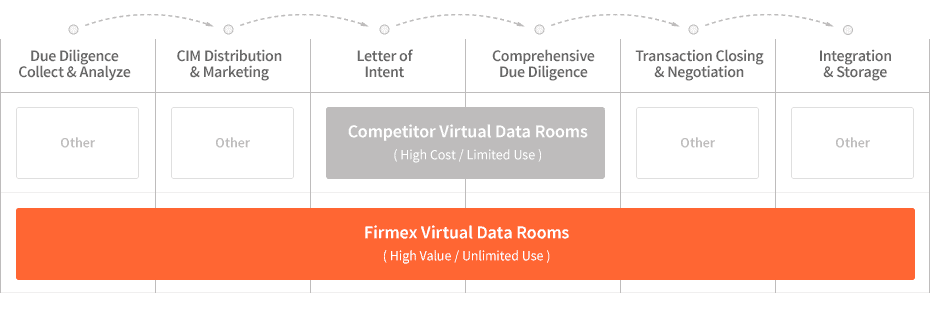Due Diligence Resources:
- What is Due Diligence?
- Due Diligence in M&A
- Due Diligence steps
- Free Checklist download
- Best practices & war stories
- Due Diligence webinars
What is Due Diligence?
Due diligence refers to the act of investigating information relating to a person or business. It can be done on a voluntary basis, like conducting a background check on a future employee, or it can be a legal requirement in business, for example during a corporate takeover bid. In this scenario, a potential acquirer evaluates a target company and its assets prior to making an offer.
Examples of Due Diligence

The content on this page focuses primarily on due diligence relating to mergers & acquisitions (M&A).
Due Diligence for M&A
The M&A process involves buyers and sellers connecting with each other to complete a transaction. This can either result in one business acquiring another, or two business merging into one. Buyers are said to be on the “buy side,” and sellers on the “sell side.”
Firmex is there for the entire deal
The Typical Deal Life Cycle

The due diligence process typically begins when a potential buyer signs a Letter Of Intent (LOI). LOIs are a signal of serious interest by the buyer. Once signed, the seller is typically under exclusivity with that buyer.

Due Diligence Steps
1. Protecting confidential information
Sharing confidential information about your business with a potential buyer can be unnerving. That’s why buyers are usually asked to sign a Nondisclosure Agreement (NDA). A good NDA sets the ground rules for what information will be shared and when (e.g. sensitive competitive information may be shared later on as the deal progresses). It stipulates how information is to be used, and may include prohibitions on solicitation of employees. It also outlines the processes and ongoing obligations in case the deal falls through.
2. Assembling the due diligence working group
The buyer will assemble a due diligence working group, usually comprised of people with different areas of expertise. It’s important that the team reviewing the deal understands the deal structure, economics and business purpose. They need to ensure that everything is reviewed correctly by the right people in a timely manner.
3. Requesting and Reviewing the Material
The buy side party sends the seller a due diligence checklist (aka diligence request list), outlining which documents they would like to review. The seller then compiles and indexes the requested materials.
A typical deal can require tens of thousands of documents to be reviewed, by multiple stakeholders, asking multiple questions. M&A advisors and investment bankers leading the deal will typically use a document sharing platform known as a virtual data room to manage the due diligence process.
Online data rooms allow the buy-side team to review due diligence documents in the comfort of their own office, generally decreasing the need for travel and costs involved.
What is reviewed?
Due diligence can be divided into the following nine areas:

The due diligence process will focus on different areas depending on the type of business being acquired. Typical areas of concern include the financial, legal, tax, IT, environment and market situation of the company. However, other important areas may include intellectual property, real estate, insurance and liability coverage, debt instrument review, employee benefits and labor matters, immigration, and international transactions. The areas of concern will dictate which due diligence documents are requested, and who will review them.

4. Results of the review
Due diligence is an evolutionary process, and the review of one document may prompt an additional line of inquiry. Managing this process on large deals can be quite difficult, which is why many leading data room providers have a Q&A module built into their platform. This ensures that the correct questions and document requests are reviewed and handled by the right people.
All the due diligence documents will be reviewed over a period of days or weeks. The results of the review will be compiled and used in negotiations between the buyer and seller.
Any errors, miscalculations, or omitted information during the due diligence process can be catastrophic. In a perfect world, the due diligence process should indicate to the buyer the value of the target company. However, it is often the case that documents are withheld, misunderstood, improperly reviewed or never requested. This can result in the buyer feeling they overpaid for an asset and, in many cases, lead to litigation.
Free Due Diligence Checklist
Be prepared for due diligence ahead of time by downloading one of our checklists. Each checklist is provided in Excel and can edited according to your needs.
- Commercial Real Estate
- Consumer Goods
- Industrial
- Manufacturing
- Mining & Resources
- Technology
- Healthcare
- General
Fill out the form to download your free due diligence checklist.
Tools of the trade
During due diligence, tens of thousands of documents will be reviewed by multiple stakeholders, asking multiple questions. Sell-side companies typically use a document sharing platform known as a virtual data room to run the deal. Virtual data rooms are used to organize and share due diligence documents, and include multiple features to protect such confidential information, including user permissions, document protection (expired access, watermarks etc.), reporting, and a Q&A module for full audit-ability of activity.
Due Diligence Best practices & War stories
Comprehensive due diligence isn’t always easy, and some of the biggest companies in the world even make mistakes. Andrew Sherman, Partner at Jones Day, shares his best practices for ensuring a smooth due diligence process. (See the full transcript)
Due Diligence Webinar Series
- Due Diligence Best Practices and Pitfalls
- Sell Side M&A – Smart Moves and Deal-Killers
- Harvesting Intangible Assets
- More Webinars



